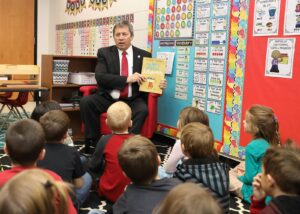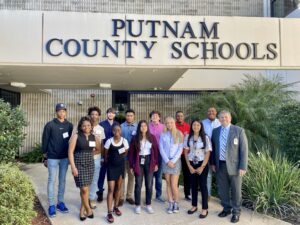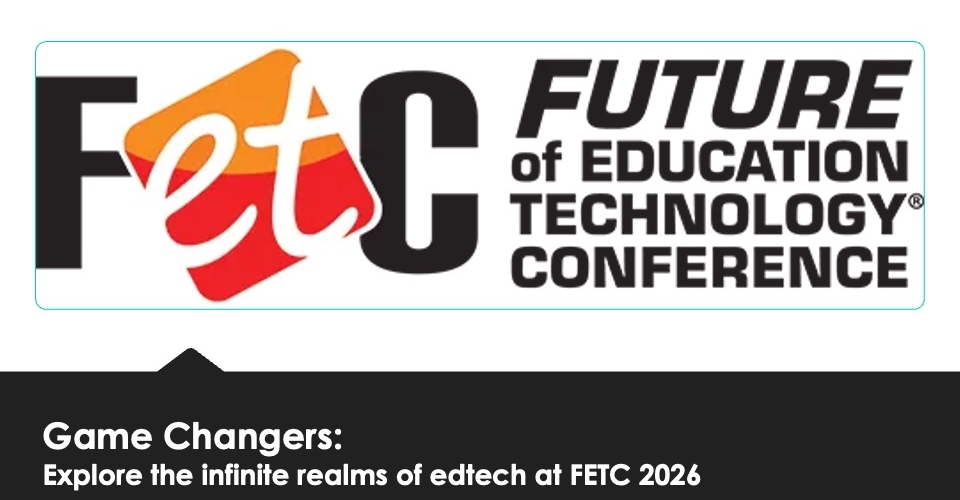“I may not be around forever, but I can create something that is.” This is a quote that hangs above this superintendent’s desk as a reminder of what he sought to do when he was elected in 2016: leave a legacy.
Rick Surrency, superintendent of Putnam County Schools in northeast Florida and the state’s 2023 Superintendent of the Year, is entering his 45th year in education, a run he says may not be over any time soon. “I don’t know if I ever want to stop working,” he says with a smile. “I just enjoy it so much. It’s a passion of mine. I actually retired six years ago for a short time, and that’s when I became superintendent.”
Surrency is an elected superintendent, and in 2015 he was approached by some business people pleading for him to run for the job because of the district’s drastically low graduation rate.
“We had a 54.9% graduation rate, which was dismal,” he says. “And that was the reason a lot of people would not move here—because our schools were underperforming.”
Within five years, he and his colleagues did something the entire community never had imagined: They raised graduation rates by nearly 30%.
“We put together a team and did a lot of research and we actually put together a five-year plan to increase our graduation rate to 80%. But we actually surprised ourselves and started improving better than we had originally planned. In 2021, after five years, we improved graduation rates to 92.5%, which is the largest increase in the entire state of Florida.

“Out of our 18 schools, we had 11 that were in state turnaround, which essentially meant that they were failing schools. Through a lot of hard work, strategic initiatives and improving instructional practices we’ve been able to—through our student achievement scores—remove all those schools from state turnaround.”
For years, nobody believed the district was capable of success, according to Surrency. It was excuse after excuse until they received their wake-up call.
“The thing that’s special about our district is that it’s traditionally a low-income, high-poverty district,” he explains. “However, we’ve been able to change the expectation of the district and the people. For years and years, people have just said, ‘We can’t get any better because…’ or ‘We have all these things going against us. We have old buildings, high poverty, businesses won’t come here.’ It was at one time called a ‘dying city’ by one magazine. And that woke up a lot of people and I think challenged our perception.”
Since achieving this momentous feat, the district has been seemingly unstoppable. And Surrency believes it’s a story of what’s possible through hard work and persistence.
“We are a district on the rise now,” he says. “We just passed a bond referendum of $300 million to essentially rebuild every school in our district. That’s very exciting. And to me, it’s about the fact—even during this tough economic time—people trusted me and our administration to do that. Because we were not very optimistic that we could pass it. But I think people felt like our school district had benefited our community and developed a lot of trust. And I felt like their voting to pass that bond was just a vote of confidence for us. Our district is a story of what’s possible. If you get enough momentum and build a culture where people feel like they can succeed. I’m really excited about what the future holds.”
For the students in Putnam County who have historically been left on the back burner, there’s much to look forward to.
“We’ve started several new academies,” Surrency says. “We have a building construction academy that we’ve started to meet our local economic needs. We started an advanced manufacturing academy which is going to support one of our largest employers. And now, we are in the process of starting an aviation academy where kids can actually build airplanes or repair airplanes. We have the possibility of actually getting some planes donated to us. We’re also looking at the possibility—we’re in the exploration phase—but we’re looking to try and provide pilot licensing for our students. Not only private licenses, but we’re working with our postsecondary providers in the local community and also possibly an airline where our kids can eventually get into the pipeline of being a commercial pilot. If we could do that and really meet the local and regional needs in Florida, that would be a game-changer.”
“I’m really excited about that, and that’s why our graduation rates are improving because kids see education as relative. It’s something that’s going to help them once they cross the stage. It’s going to help them be successful. That’s all we want. We want our kids to grow up and be contributing members of society.”
Like many other districts across the nation, Surrency says he’s noticed a lot of mental health and behavioral issues across his students since beginning the first “normal” year since the pandemic.

“I know we’re not alone in this aspect,” he says. “The student behavior is so out of the norm. We’re also seeing a lot of adult mental health issues. And of course everyone knows about the teacher shortage and simply finding teachers in general. I think this has really been a big adjustment since the pandemic. People are trying to figure out what normalcy is again.”
As far as education and education technology go, and many other district leaders and CIOs would agree, we can’t go back to normal, he adds.
“The big takeaway is we can’t do things as we did before the pandemic,” he says. “I think this has been a huge wake-up call as far as how technology can bridge a lot of those gaps. And I just feel like as bad as the pandemic was, it’s one of those things where you never let a good crisis go to waste. I think it helped to accelerate education of the future. And I think our students are demanding that now. The normal standing in front of kids and teaching at them is not going to work anymore. We have to be more engaging with our students.”
Moving forward in 2023, as always, his priorities are all centered around student success in and outside the classroom from kindergarten and beyond.
“We have a five-year strategic plan and we’re in our second year,” he says. “Part of that plan is what we call the ‘portrait of a graduate.’ I spoke about getting kids across the graduation stage on time, but when kids cross that stage, have we positioned them to be the best they can be whether they go to college or whether they’re starting their careers?”
“In 2023, we’re going to be looking at our systems,” he adds. “I’m real big on systems. I want to make sure that not only are we preparing these graduates when they’re in high school; this is a kindergarten-through-12 initiative. And we need to back up every year and ask, ‘Are we doing what we need to do in the early grades to position these kids to be successful in junior high and senior high school?'”
What keeps him up at night, however, is the academic toll the pandemic has had on his younger students.
“In Florida, we’ve just implemented new math and ELA standards,” he says. “Our students in the early grades have really taken a hit from the pandemic. They didn’t get a lot of those foundational skills. So our main goal is preparing our teachers to address those learning gaps because if those kids who are going into third grade aren’t proficient or successful in reading, years from now their academic trajectory will suffer.
“Our big focus right now is making sure we build that foundation in the early grades,” he continues. “And that portrait of a graduate still applies to them. We got to make sure they’re going to be successful when they walk across that stage because they’re going to be taking care of us one day,” he says with a smile. “We have to make sure we’re taking care of them right now.”
Each day, Surrency serves with intent and the understanding that whoever shall take his place when his time in education comes to a close, each piece of the puzzle will already be in place. It will be up to them to keep the ball rolling.
“That’s what I’m doing,” he says. “I’m trying to leave a legacy and position our district where anybody can step in and just keep the momentum going.”
More from DA: Leadership series: Meet the superintendent who is all smiles this year



